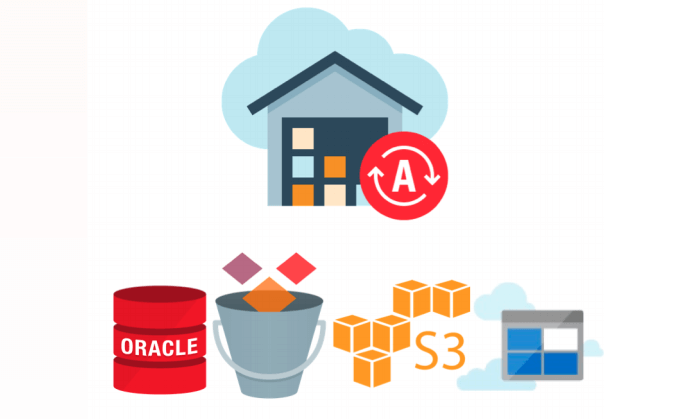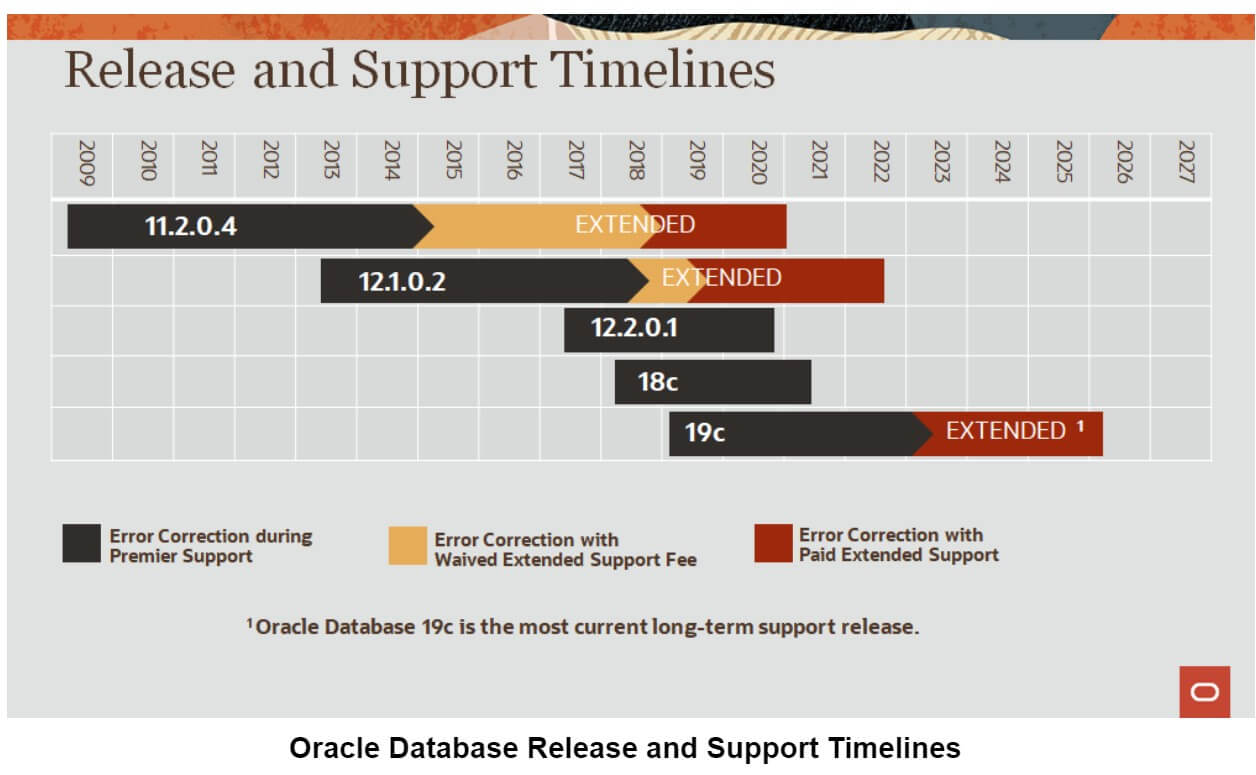Oracle Database 19c was released back in January 2019 on Oracle Live SQL and is the final release of the Oracle Database 12c product family. Oracle Database 19c comes with four years of premium support and a minimum of three extended support. It also forms a foundation for Oracle’s next phase of autonomous database optimizations.
Oracle Database 19C: What Has Changed
As we already mentioned, Oracle Database 19c is the final long-term release of the Oracle 12.2 family of products. Oracle changed the version number scheme back with Oracle 18c (12.2.0.2), in an attempt to be more in line with the way Cloud releases are described and numbered. So Oracle 19c is actually equivalent to 12.2.0.3, and it will be supported through 2023, with Extended Support into 2026.
A few more important highlights of Oracle Database 19c are:
- Since 19c has been released on most major platforms, Oracle’s focus on suggesting an upgrade has moved from 18c towards 19c.
- 19c can be deployed as a Bare Metal, Virtual Machine or Exadata database, or as Autonomous.
- To benefit from Autonomous Database features, it must be specifically selected during DBS creation.
- If you are currently running 11.2.x/12.1.x you will need to upgrade to the terminal release for the product you are running and then continue the upgrade process by upgrading to the 19c Database.
New Features
Oracle Database 19c builds upon the innovations of previous releases like Multitenant, In-Memory, JSON support, Sharding, and many other features that enable Oracle’s Autonomous Database Cloud Services.
This latest release introduces new functionality, providing customers with a multi-model enterprise-class database for all their typical use cases, including:
- Operational database use cases such as; traditional transactions, real-time analytics, JSON document stores, and Internet of Things (IoT) applications
- Analytical database use cases such as; traditional and real-time data warehouses and data marts, big data lakes, and graph analytics.
- Additional capabilities for better support of GDPR
Here are some of the top new features:
- Automatic Indexing. This feature uses machine learning (ML) algorithms to create and constantly adjust indexes to improve performance and cost savings. This means you can start the database without any, or with very few, indexes, and over a short period of time, the database will look at the way the data is queried and build indexes to provide efficient access plans for that dataset.
- Active Data Guard DML Redirect. Oracle launched Oracle Active Data Guard back in Oracle Database 11g, to help customers get more use from that standby database by running reports and backups against it. In Oracle Database 19c, Oracle adds an important twist on this feature which enables you to do transactions against the standby database.
- Hybrid Partitioned Tables. This feature enables database administrators to manage a table between partitions inside the database and partitions held on low-cost read-only datastores outside the database. These data stores can reside on-premises or in the cloud.
- JSON Support. Support for JSON gets improved. Oracle improved and simplified the syntax for our JSON functions and introduced the capability to do a partial JSON update. In addition, Oracle Database 19c includes new Simple Oracle Document Access (SODA) APIs for Java, Python, C, and Node.js.
- Query Quarantine. The overall performance of a data mart or a data warehouse can suffer when a user runs a query that consumes an excessive amount of I/O and computes resources. Oracle Database 19c can automatically quarantine those queries and ensure that they don’t run again, resulting in consistent performance for all database users.

To learn more about these and other features in Oracle Database 19c, check out Oracle’s documentation here or at My Oracle Support, Document ID 742060.1.
Upgrading To Oracle Database19C
Compatibility Matrix
The supported Oracle database versions that can be directly upgraded to Oracle Database 19c are as shown below:
| Source Database |
Destination Database |
| 18 (all releases) | 19c |
| 12.2.0.1 | 19c |
| 12.1.0.2 | 19c |
| 11.2.0.4 | 19c |
Upgrading to Oracle Database 19c directly is not supported to the rest of the database releases/versions, not mentioned above. So first you need to upgrade to an intermediate Oracle Database release which can be then directly be upgraded to 19c.
EBS Compatibility Matrix for Upgrading to Oracle Database 19c
Oracle Database 19c (19.3) is only compatible with Oracle EBS 12.1 and 12.2, so companies using previous versions of Oracle EBS would need to upgrade their application before upgrading to Oracle Database 19c.
Reasons For Upgrading To Oracle Database 19C
Quite often database administrators (DBAs) push back on an Oracle database upgrade, besides the CPUs, under the rationale that if everything is running fine why touch it? but there are multiple reasons why you should be upgrading to Oracle Database 19c besides the new features.
- Lifetime support policy. Support waivers end soon. All EBS customers running on 11.2 or 12.1 databases must upgrade to 19c to remain fully supported.

For details on the Lifetime Support Policy (Premier, Extended, Sustaining), see Lifetime Support Policy – Oracle Technology Products.
- Supportability. Older Oracle versions aren’t supported or certified on newer operating systems. If you want to keep up with whatever platform changes your server team has planned, you should keep up with Oracle upgrades. Another thing to look at is your operating system certification and the stable release. Does your current version of your Database is supported by your intended operating system?
- Security. Upgrading to the latest release of the Oracle database means you obtain the benefit from the software with built-in security at every level.
Conclusion
Upgrading to Oracle Database 19c is highly encouraged and since it is the final 12.2 release it future proofs the database architecture. However, upgrading to a new database version should be considered a project requiring methodology, planning, testing, and experience. IT Convergence can help you. With the right planning, preparation, best practices, and hundreds of Oracle database upgrades, your project will be simpler, faster and won’t impact operational continuity during and after the upgrade.
Learn more about how we can help you upgrade your Oracle Database by contacting our experts here.
Need Help Maximizing Your Oracle EBS Investment?
ITC can help you define your ERP Modernization roadmap plan. We provide unbiased advice to determine the best roadmap for you, whether that is upgrading your On-Prem E-Business Suite, migrating to Cloud SaaS applications or going with a Coexistence (Hybrid) model. Our assessment methodology takes into account your current business processes and IT footprint, to establish the effort and fit of these options and ultimately, recommend a clear path to innovation.
Request our assessment and take things at your own pace.

